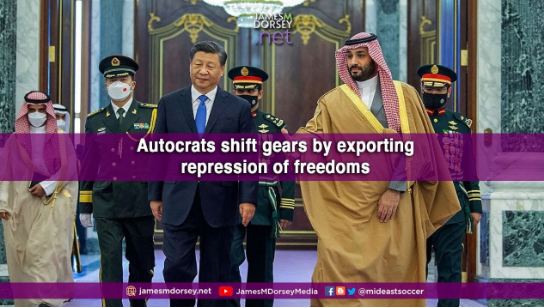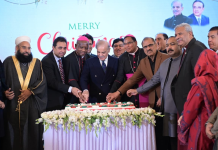Increasingly, muzzling political freedoms beyond national borders is part of an autocrat’s toolkit. Men like Saudi Crown Prince Mohammed bin Salman and the presidents of Turkey and China, Recep Tayyip Erdogan and Xi Jinping, are no longer satisfied with silencing critical voices and controlling the media at home.They also want to drown out those voices abroad by demanding compliance with their repression of freedoms of expression, media, and assembly in international and commercial negotiations.Last week, US Senate investigators discovered a non-disparagement clause that could be interpreted as preventing the PGA Tour and players from criticizing Saudi Arabia tucked into a framework agreement that would merge the sports’ main flagship tournament organiser with LIV Golf, a Saudi-backed rival startup owned by the kingdom’s sovereign wealth fund, the Public Investment Fund (PIF).The clause stipulates that “each party agrees and covenants that it will not at any time, directly or indirectly, make, publish or communicate to any person or entity or in any public forum any defamatory or disparaging remarks, comments, or statements concerning the other Party, their affiliates and ultimate beneficial owners or their respective businesses, directors, employees, officers, shareholders, members or advisors.”Pushing back against the clause, US Senate Investigations Subcommittee Chair Richard Blumenthal secured in a hearing about the merger a commitment from PGA Chief Operating Officer Ron Price that he “wouldn’t recommend” a final deal to the group’s policy board for approval if it contained language barring players or executives from criticizing the kingdom.”We will protect our players proudly. Our players will be freely able to speak about Saudi Arabia,” Mr. Price ultimately told Mr. Blumenthal after first arguing that such clauses were common practice during business negotiations.Last month, sports journalist Karim Zidan disclosed in a co-authored New York Times article that soccer superstar Lionel Messi had signed a contract with Saudi Arabia with a similar clause.Mr. Blumenthal’s push reflected widespread concern that Saudi Arabia was using its financial muscle for investment in a broad range of sports that would distract attention from the kingdom’s abysmal human rights record, squash criticism, and shape the dominant narrative about the country. Mr. Blumenthal noted the 2018 killing in Istanbul of Saudi journalist Jamal Khashoggi.To be sure, reputation is one driver of Saudi sports investments, including the acquisition of English Premier League club Newcastle United, some of the world’s foremost soccer players, Formula 1 racing, esports, and possibly tennis.More important drivers may be Mr. Bin Salman’s economic diversification plans involving creating a sports and entertainment industry, turning the once-secretive kingdom into a tourist hub, and attracting foreign investment.Public health, too, is a driver in a country with some of the world’s highest diabetes and obesity rates.Even so, non-disparagement clauses in Saudi sports contracts are part of a broader autocratic overt and covert attempt to squash dissent abroad, control the narrative beyond the borders of their legal remit, and force other countries and foreign entities to abide by their definitions of terrorism that often are designed to criminalise non-violent dissent and freedom of expression and belief.In recent negotiations over Swedish accession to NATO, Mr. Erdogan unsuccessfully attempted to force Sweden to ban Kurdish protests in violation of Swedish law, which guarantees freedom of expression and assembly.Mr. Erdogan defines any expression of Kurdish nationalism as support for the outlawed Kurdish Workers Party (PKK) that has waged a 50-year-long low-intensity war against Turkey. Turkey, alongside the European Union and the United States, designated the PKK a terrorist organisation.Among autocrats, Mr. Xi may be the most strategic and aggressive in attempting to control the narrative.China’s wolf diplomacy involves everything from imposing economic sanctions on countries that take issue with Chinese policies and attempts to ban exhibitions of dissident Chinese artists and intimidate independent journalists and Chinese nationals residing abroad.In Africa, China dominates the shift from analogue to digital television and has launched television satellites and networks of fibre-optic cables and data centres to control news production and transmission.Similarly, China has successfully sought to gain control of Chinese-language media abroad, with Singapore standing out as a rare exception.China “has drastically expanded its control over Chinese language media in many countries, making it almost impossible for Chinese language readers and viewers to get impartial sources of information about Beijing,” said Joshua Kurlantzick, author of a book on China’s global media strategy.Saudi, Turkish, and Chinese extra-territorial efforts go to the heart of US President Joe Biden’s framing of the struggle to shape a 21st-century world order as a battle between autocracy and democracy.Winning that battle requires robustly thwarting autocratic efforts to export their controls, muzzle foreign independent media, and repress political rights abroad. That is not to say that repression at home should be legitimized.But allowing the export risks not only losing a battle but potentially losing a war.“If countries committed to democracy are to start winning, they need to confront authoritarians in areas they least want to be confronted while also ensuring healthy media environments at home. Independent media needs to be at the core of that effort,” said James Dean, Head of Policy at BBC Media Action, a BBC charity, and co-founder of the International Fund for Public Interest Media.
Dr. James M. Dorsey is an award-winning journalist and scholar, an Adjunct Senior Fellow at Nanyang Technological University’s S. Rajaratnam School of International Studies, and the author of the syndicated column and podcast, The Turbulent World with James M. Dorsey.
© Centreline Magazine












